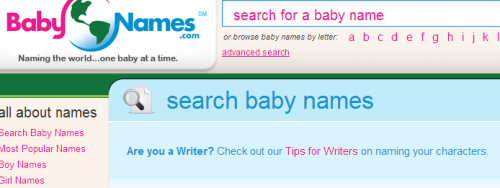Fant dette(via Tumblr) på en side for barnenavn, og syns det var gode tips, mye her jeg ikke hadde tenkt på før. Jeg er nok ikke en som legger noen spesiell vekt på eller mening bak karakternavnene mine, men kanskje er det noe å tenke på i framtida.
There are many literary and movie characters that become everlasting brands in our culture—Atticus Finch, 'Ratso' Rizzo, Holden Caulfield and Scarlett O'Hara, for example. If you name your character right, you will choose a name that is unique to your character and memorable to your story. The names you choose should reveal something about your characters: who they are, where they come from or where they are going. Here are several tips we compiled for writers of stories, novels, tv and movies to help you choose the perfect name for your characters.
Tip 1: Make the name age-appropriate
The biggest mistake we see writers make is choosing a character name that is not age-appropriate. Many authors make the mistake of choosing a name that is popular now for an adult character--a name that would have rarely been used around the time of that character's birth. Decide the age of your character and then calculate the year your character was born. If your character was born in the U.S., browse the Social Security Name Popularity List for that year. You will also want to take into account the character's ethnic background and the ethnic background of his/her parents.
Tip 2: Choose a name by meaning
Many writers give their characters names that have significance in the story. It could reflect major personality traits, or the character's role in the story. You may want to use our advanced search to search by literal meaning, or think of ways to incorporate other meanings into your character's name. For example, if your character is a botanist, you may not want to name her Flower (too literal), but you may want to consider the names Linnea or Sage. Even if you choose not to name a character by meaning, you should look up the meaning of all your characters' names—there may be something that inspires you or, on the other hand, conflicts with your message.
Tip 3: Exotic romance names are out
Thirty, forty years ago, you would pick up a romance novel and the characters would have ridiculously exotic names like "Crystal Remington" or "Rod Delaware." Same with daytime soap operas. However we're seeing a shift in the past decade or so: romance and soap writers have modernized their character names so readers can relate to them. Naming a romance character should be no different than naming any other fictional character. If you use all the other good character naming tips, you'll create a genuine player to whom your readers can relate.
Tip 4: Science fiction names don't have to sound alien
It's difficult to predict what names will be popular in the year 3000, however you don't have to make your science fiction characters sound like they are from Mars (unless they are). When a person reads (or watches) your story, you don't want them to stumble over a name. The name Zyxnrid, for example, would be difficult to read or listen to every time the character is referenced—and may detract from your overall story. If you do choose to create your sci-fi name, you may want to:
Combine two common names to make a less common, but pronounceable name. Example: Donica (Donna and Veronica).
Use ancient mythological names, or combine two of them. Example: Ceres or Evadne.
Make it easy to pronounce and spell. Example: Bilbo Baggins from Lord of the Rings.
Tip 5: Terms of Endearment
When writing your story, be aware that people who are close rarely use each other's full names. Couples will use nicknames, terms of endearment (honey, dear, boo). What nickname have your characters come up with for each other? Also, parents rarely call their children by their full names--unless they are admonishing them for bad behavior or testifying in court. If you have loving parent characters that are addressing their kids, use a nick name or term of endearment (sweetie, baby, D.J.). An exception to this would be if you want to show the parent character being cold and distant to their child.
Tip 6: Overused Names
For some reason, every writer loves to name his hero JACK. I know it's a tough-sounding, honest-working name, but naming your hero Jack is like naming your son AIDAN. It's overdone. Be a little more creative, so your reader will remember your particular protagonist as opposed to the umpteen-million other books they've read about Jack. Also, do not give your protagonist the initials J.C. as an allusion to Jesus Christ. That tactic was overused in 60's/70's fiction and is almost laughable by today's standards.
Tip 7: Loaded Names
Watch out for what we call "loaded" names--names that have a popular association. These could be names associated with celebrities, historical or infamous people like Adolf, Oprah, or Kobe. They could also be names of famous literary, tv, or movie characters: Hannibal, Scarlett, Romeo, Bart. If you do choose to use "loaded" names, then you really should make it part of the story, part of the character. Your character's mother was obsessed with Gone With the Wind, so she was named Scarlett--how has it affected her throughout her life? How does it affect her in the story?
Tip 8: Have Fun With Names
Have fun with naming your characters and take time to see what "fits." What was your character's childhood nickname? Is that an embarrassment when his parents address him in front of his friends? Did your character change his name at any point in his/her life? If so, why? Does your female character want to change her surname when she gets married? Why or why not? Names are such an important part of one's identity, don't take it lightly with your story!


Ingen kommentarer:
Legg inn en kommentar